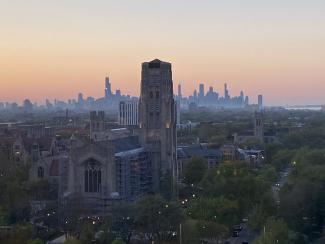
Research Resources
The library system of the University of Chicago, one of the largest university collections in North America, contains over 12 million volumes in print and electronic form. Classics students will find most books and periodicals dealing with the ancient world in the Joseph Regenstein Library, but may want to consult holdings in the Institute for the Study of Ancient Cultures Research Archives, in the D'Angelo Law Library, or in the John Crerar Library for science and technology.
The specialist bibliographer for Classics at Regenstein Library is Catherine Mardikes.
The Library’s Research Guide to Classics provides a comprehensive list of resources. Online Greek and Latin dictionaries are available at Logeion. Students may find the Library's other research guides in related subjects to be useful as well.
The Classics collection began as a key component of the Library’s founding acquisition, the Berlin Collection of 1891, and subsequent development has been continuous. Ongoing routine acquisitions as well as substantial block purchases and donated collections have built one of the country’s most significant research resources in the field.
In addition to current monographs, the Library receives more than 1500 serials of interest for the study of ancient Greece and Rome. Major editions of classical texts printed from the Renaissance through the 18th century are found in the Special Collections Research Center, which also houses collections of papyri and Greek and Latin manuscripts.
The Classics Reading Room contains a full collection of Greek and Latin texts and commentaries, as well as the epigraphic, art historical and archaeological collections, other basic resources, and it provides a comfortable place to work and study with other classicists.
The following list of resources are available online:
· The Library Catalog can be searched for all materials held by the University of Chicago Library.
· The Research Guide to Classics at the University of Chicago Library provides further resources and advice for research, with additional pages devoted to Greek and Latin language study.
· The Classics Serials Guide can be searched for the locations of and information about print and online serials at the University of Chicago Library.
· The Guide to Art History and Visual Arts provides information for art historical and archaeological research.
· E-Journals provides access to individual journal titles available online through the University of Chicago Library.
· The Research Guide to Papyrology provides resources and advice for the study of papyri. There are also Research Guides for Epigraphy and Numismatics.
· The Electronic Full-Text Sources Guide provides links to primary sources.
· There is also a Manuscript Source Guide.
· For helpful resources on historical cartography and spatial analysis as well as digital maps, see the Ancient World Mapping Center and its Antiquity À-la-Carte database, Pleiades, and the Digital Atlas of Roman and Medieval Civilizations.
Museums and Collections
The University of Chicago has access to world class museums and collections of material culture from the ancient Mediterranean world, both on campus and in the broader Chicago area. These include The Institute for the Study of Ancient Cultures, established in 1919 by James Henry Breasted as a premier center of research on the history, art, and archaeology of the ancient Near East. Within the OI is the Center for Ancient Middle East Landscapes (CAMEL), a renowned hub for learning geospatial analysis using historical archives of spatial and archaeological data. The Smart Museum of Art, located north of the Regenstein Library, possesses significant Greek, Roman, Cypriot and other ancient material that can be utilized in teaching, especially through coordination with the Feitler Center of Academic Inquiry, which promotes object-oriented pedagogy through the museum’s collections. These institutions offer several opportunities for student involvement, including internships and research assistantships.
On campus, several institutes, libraries, and centers offer opportunities to engage with exhibitions or colloquia pertinent to the study of the ancient world. Housed within the Regenstein Library, The Franke Institute for the Humanities is a key locus of intellectual activity on campus that often hosts fellows, conferences, and symposia working on ancient material. The Neubauer Collegium for Culture and Society regularly presents collaborative research projects that incorporate the visual arts and material culture, as does the David Logan Center for the Arts. The University’s professional Court Theatre also hosts performances and compositions in collaboration with faculty that frequently involve translations, adaptations, and transformations of classical texts.
In addition to the numerous workshops and events happening across campus, students interested in the ancient world can find collegial networks like the undergraduate-run Classics Society and UCAN, the University of Chicago Archaeological Nexus, which provides access and information on events, courses, and current research and fieldwork opportunities for the archaeological community of faculty members, postdocs, and students.
Further afield, the Art Institute of Chicago offers access to renowned collections of ancient art and archaeological material, while the Field Museum of Natural History has acquisitions of Greek and Roman material from its founding and establishes periodic exhibitions of historical objects.
Life at University of Chicago
Campus & Student Life, which comprises 18 offices, exists to help Chicago students and members of the University community navigate living on and around campus. They provide information and resources to learn about everything from academic opportunities to dining options, housing, health and wellness, safety and transportation, and spiritual life on campus.
An additional critical resource on campus is UChicagoGrad, which is dedicated to helping graduate students and postdocs receive training related to teaching, writing support, and career preparation as well as to skills in public speaking and networking. Their website provides important guides for academic support, a database of internal and external fellowships, as well as information on graduate life on campus and in Hyde Park. Prospective and incoming international students may further wish to read the Division of the Arts & Humanities' advice for international students.
